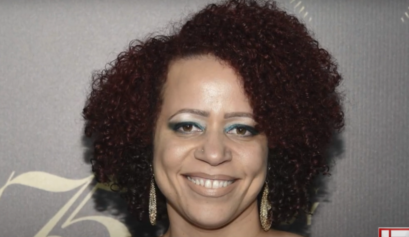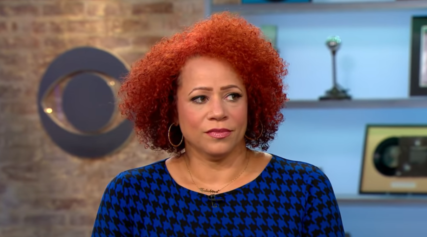A cable news host and the creator of the 1619 Project had a lively debate this week over how “great” was the Greatest Generation. The contentious but collegial exchange was sparked by the sentiment that those who lived in America during the Second World War “brutally suppressed” people of African descent living alongside them in the country.

CNN+ anchor Chris Wallace invited Nikole Hannah-Jones, the driving force behind The New York Times’ controversial series the 1619 Project, to be one of his first guests on his show “Who’s Talking to Chris Wallace” on the new CNN streaming service.
The two disagreed about the 1619 Project’s claim the America cannot separate the reality of Jim Crow, voter suppression, and segregation from the legacy of those born between 1901 and 1927, which has come to be known as the Greatest Generation or the G.I. Generation.
Reading from Hannah-Jones’ Pulitzer Prize-winning opening essay to the 1619 Project, Wallace quoted the Howard faculty member saying, “Without the idealistic strenuous and patriotic efforts of Black Americans, our democracy today would most likely look very different. It might not be a democracy at all.”
“We like to call those who lived during World War II the Greatest Generation, but that allows us to ignore the fact that many of this generation fought for democracy abroad, while brutally suppressing democracy for millions of American citizens,” he read.
Wallace asked her about her contention, saying, “Again, I am in no way minimizing our terrible racial legacy. But in some of these things, aren’t you overstating?”
Hannah-Jones answered by asking Wallace, “How would you define democracy?”
Wallace answer, “rule by the people,” sparking a back-and-forth that starkly demonstrated two separate mindsets about American history.
“If you have half of the country — where it’s in some states majorities, in many other states pluralities, 25 percent of the population, 40 percent of the population, cannot vote, have their vote violently suppressed, where they’re a single one-party, one-race rule in a region where about 30 percent of the population is Black … would you consider that democracy?”
The former Fox News staple responded by declaring the young adults from “ethnic neighborhoods in Brooklyn and South Philly” and who “stormed the beaches of Normandy” were not “brutally suppressing Blacks.”
Hannah-Jones stood firm, volleying back, “Well, they were.”
Wallace was not convinced. He countered saying, “No, they weren’t. You don’t be telling me that a farm, that a kid coming off a farm in Indiana, or a kid who came from Brooklyn, was suppressing Black people.”
“Indiana has the largest population of the Klan in the United States. The Klan was raised, was reached first in Indiana,” Hannah-Jones responded.
“The average age of a soldier in the Second World War was in his 20s or 30s,” said Wallace, charging that his guest was painting those men “who defended democracy” with a broad brush.”
She replied to this assertion, “But a 30-year-old is a fully grown person who can serve in Congress, who can be the mayor, who can act, enact laws and policies — these are not children. These are not babies.”
She is not alone in her views.
A recent study, released in December of 2021, called “The American Soldier in World War II,” conducted by Virginia Tech and funded in part by the National Endowment for the Humanities reviewed the actual beliefs of white soldiers who fought in WWII and their candid thoughts about race, white supremacy and racial equality.
The university’s assistant professor of history Edward J.K. Gitre led the research and determined that the complexion of the generation is more complicated than just the traditional heroic view espoused by so many.
“It does speak to a generation,” he said in a recent interview. “The good, the bad, the ugly, heroic, not heroic.”
The study guaranteed anonymity to the 300,000 surveys that survived over time by not sharing individuals’ names.
An unnamed American soldier in August 1944 wrote in a questionnaire, “White supremacy must be maintained.”
He continued, “I’ll fight if necessary to prevent racial equality. I’ll never salute a negro officer and I’ll not take orders from a negroe. I’m sick of the army’s method of treating …[Black soldiers] as if they were human. Segregation of the races must continue.”
He was not the only one. A different soldier said, “God has placed between us a barrier of color … We must accept this barrier and live, fight, and play separately.”
The unadulterated study of approximately 500,000 soldiers was massive, consisting of 65,000 pages currently stored in the National Archives, the Washington Post reports.
Conservative Republicans have also rejected the findings of the 1619 Project, linking it to their attack on what they falsely claim is critical race theory being taught in American primary and secondary schools.
The arguments put forth by members of the GOP are that the research is skewed and that it makes young white children feel insecure about the legacy of systemic racism that their ancestors may or may not have participated in.
Sen. Ted Cruz of Texas used these arguments when he interfaced with then-judge Ketanji Brown Jackson during a Senate hearing before the judge became the first Black woman to be confirmed to the highest court of the nation.


